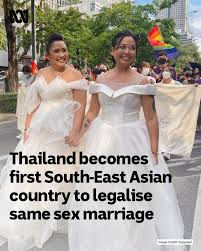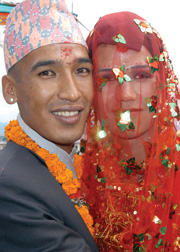Thailand is poised to become the first nation in Southeast Asia to legalise same-sex marriage after the Senate approved a marriage equality bill on Tuesday, 18 June. The bill’s passage is heralded as a monumental step forward for LGBTQ+ rights in the region.
The Senate voted overwhelmingly in favour of the bill, with 130 senators supporting it and only four opposing. The legislation now awaits the king’s endorsement, a procedural formality, before becoming law 120 days after publication in the royal gazette.
Prime Minister Srettha Thavisin, of the Pheu Thai Party, who promised to advance the marriage equality bill, has been an active supporter of LGBTQ+ rights, attending Pride Month celebrations in Bangkok. “It is a basic right to choose who to love,” he declared on social media earlier this month, reinforcing Thailand’s commitment to social equality and inclusivity.
This landmark decision positions Thailand as the third Asian territory to embrace marriage equality, following Taiwan in 2019 and Nepal in 2023. Panyaphon Phiphatkhunarnon, founder of the Love Foundation, an NGO advocating for LGBTQ+ equality, celebrated the bill’s passage. “The bill represents a monumental step forward for LGBTQ+ rights in Thailand,” Panyaphon told CNN. “The potential impact of this bill is immense, changing the lives of countless couples and contributing to a more just and equitable society.”
The new law will grant LGBTQ+ couples the same legal rights and recognition as heterosexual couples, encompassing inheritance, adoption, and healthcare decision-making. Panyaphon emphasized the broader societal implications, stating, “Beyond the legal implications, the passage of this bill would send a powerful message of acceptance and inclusion.”
Bangkok residents Pokpong Jitjaiyai and Watit Benjamonkolchai, who plan to marry once the law is enacted, highlighted the personal significance of this change. “When I was young, people said people like us couldn’t have a family, couldn’t have children, so marriage was impossible,” Pokpong shared with CNN. “Over 10 years ago, we could not live together the way we are now… and now I can freely say that I am gay.”
A Stark Contrast with India’s Stance on LGBTQ+ Rights
Thailand’s progressive move stands in sharp contrast to India, where the struggle for LGBTQ+ rights continues to face significant obstacles. Despite a landmark 2018 Supreme Court ruling decriminalising homosexuality, India’s top court recently declined to recognise same-sex unions legally, a decision that many view as a betrayal of democratic principles.
India’s refusal to legalise same-sex marriage highlights a broader regional trend of discrimination against sexual minorities. In many Southeast Asian countries, colonial-era laws and rising religious conservatism perpetuate systemic bias and violence against LGBTQ+ communities.
In stark opposition to Thailand’s inclusive stance, countries like Malaysia, Indonesia, and Singapore maintain stringent anti-LGBTQ+ laws. Homosexuality remains criminalised in Malaysia, and Indonesia’s new criminal code penalises consensual sex outside marriage, disproportionately affecting LGBTQ+ individuals. Singapore, while repealing a colonial-era law criminalising sex between men in 2022, continues to oppose same-sex marriage staunchly.
Even Japan, a member of the Group of Seven (G7), has yet to recognise same-sex unions, making it the only G7 nation not to do so. Recent court rulings in Japan have deemed the ban on same-sex marriage unconstitutional, yet legislative progress remains slow.
Thailand’s Progressive Move as a Catalyst for Change
Thailand’s decision could spark a domino effect across the region, promoting greater acceptance and legal recognition for LGBTQ+ rights. “I want the people around the world to see how love is. Love is love,” Pokpong Jitjaiyai remarked, hopeful that Thailand’s example will inspire other nations.
As Thailand sets this historic precedent, it not only cements its reputation as one of the most LGBTQ+ friendly nations in the region but also challenges other countries to follow suit in recognising and protecting the rights of all individuals, regardless of their sexual orientation




